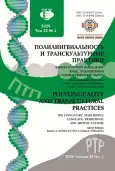The Axiosphere of the Mari Epic Consciousness Based on the Materials of the Heroic Epic “Yugorno. The Song of the Prophetic Path”
- Authors: Shkalina G.E.1
-
Affiliations:
- Mari State University
- Issue: Vol 22, No 1 (2025): THE FINNO-UGRIC MARI PEOPLE: LANGUAGE, TRADITIONAL AND ARTISTIC CULTURE
- Pages: 155-171
- Section: LITERARY SPACE
- URL: https://journal-vniispk.ru/2618-897X/article/view/326879
- DOI: https://doi.org/10.22363/2618-897X-2025-22-1-155-171
- EDN: https://elibrary.ru/HLEETG
- ID: 326879
Cite item
Abstract
The paper is devoted to the study of the cosmogonic narratives of the Mari people with a projection on the problem of epic consciousness. The purpose of the study is to recreate the value choice of epic heroes through the interaction of the axiological dominants of the Mari ethnic world based on the materials of A. Spiridonov’s poetic creation “Yugorno. A song about the prophetic path.” The novelty of the work lies in the fact that, against the background of studying the ethnological aspects of the formation of the axiological paradigm of Mari literature, the problem of reconstructing the axiosphere of the Mari epic is actualised, which is defined as the space of existence of spiritual, physical, mental, emotional factors of the formation of the Mari world. This approach is fundamentally new not only for Mari, but also for the entire Finno-Ugric literary criticism. The existing Russian research experience accumulated by representatives of various scientific fields contains elements of axiological analysis of traditional epic texts. Focusing on the theoretical and methodological foundations of such studies allows us to assert that a necessary condition for effective cultural transmission of values is to identify the content of the axiological dominants of traditional folk culture, to study both the host and nurturing, as well as well as the ethno-cultural landscape.
About the authors
Galina E. Shkalina
Mari State University
Author for correspondence.
Email: gshkalina@mail.ru
ORCID iD: 0000-0002-0790-6409
SPIN-code: 9713-5822
Scopus Author ID: 56610200700
ResearcherId: ААL-8875-2021
Doctor of Cultural Studies, Professor of the Department of Culture and Arts
1 Lenin Sq, Yoshkar-Ola, 424001, Russian FederationReferences
- Aristotle. 1983. Essays in four volumes. Vol. 4. Moscow: Mysl. Print. (In Russ.)
- Kant, I. 1965. Essays in six volumes. Vol. 4. Part 1. Moscow: Mysl. Print. (In Russ.)
- Rokeach, M. 1973. The Nature of Human Values. New York: The Free Press. Print. (In Russ.)
- Veselovsky, A.N. 1989. Historical poetics. Moscow: Higher School. Print. (In Russ.)
- Zhirmunsky, V.M. 1962. The national heroic epic: comparative historical essays. Moscow–Leningrad: Goslitizdat. Leningrad Publishing House. Print. (In Russ.).
- Likhachev, D.S. 1967. Poetics of ancient Russian literature. Leningrad: Nauka. Print. (In Russ.).
- Sokolov, Yu.M. 2007. Russian folklore. 3rd ed. Moscow: Publishing House of Moscow University. EDN: QTGKWV Print. (In Russ.)
- Andreeva, L.A., and O.F. Khudobina. Coloristic vocabulary in A.Ya. Spiridonov’s epic “Yugorno” and its Mari translation. 18 Oct. 2024, https://scipress.ru/philology/articles/koloristicheskaya-leksika-v-epose-a-ya-spiridonova-yugorno-i-ego-marijskom-perevode.html (In Russ.)
- Koshaev, A.V. The Mari heroic epic “Yugorno”: the history of creation, themes, problematics, poetics. 18 Oct. 2024, cyberleninka.ru/article/n/mariyskiy-geroicheskiy-epos-yugorno-istoriya-sozdaniya-tematika-problematika-poetika.pdf (accessed: 18.10.2024). (In Russ.)
- Fedoseeva, N.A. 2020. “ ‘Tangyra’ by Mikhail Atamanov and ‘Yugorno’ by Anatoly Spiridonov: a comparative and typological aspect.” Yearbook of Finno-Ugric Studies, vol. 14, no. 3, pp. 454–458. Print. (In Russ.)
- Fedoseeva, N.A. 2021. Heroic epics “Dorvyzhy” and “Yugorno”: similar motifs. In Scientist. Poet. Publicist: on the sixtieth anniversary of V.M. Vanyushev’s creative activity. Izhevsk, pp. 54–59. Print. (In Russ.)
- Shkalina, G.E., and R.A. Kudryavtseva. 2022. “The cultural and philosophical context of the axiosphere of Mari literature.” Bulletin of the Mari State University, vol. 16, no 3, pp. 386–396. https://doi.org/10.30914/2072-6783-2022-16-3-386-396 EDN: NLOOSP Print. (In Russ.)
- Spiridonov, A.Ya. 2002. Yugorno: song of the prophetic path: the epic of Mari: the experience of synthesis. Yoshkar-Ola: Marevo. Print. (In Mari, Russ.)
- Shkalina, G.E. 2019. The Sacred world of Mari. Yoshkar-Ola: Mari Book Publishing House. https://doi.org/10.31483/r-113295 EDN: MQAWNN Print. (In Russ.)
- Spiridonov, A.Ya. 2000. “From the author.” Onchyko, no. 4, pp. 168–169. Print. (In Russ.)
- Aktsorin, V.A. 2000. The past of the Mari people in his epic: Alpha. Print. (In Russ.)
- Lipatov, A.T. 2002. “The heroic epic of the Mari people”. In Spiridonov A.Ya. Yugorno: song of the prophetic path: the epic of Mari: the experience of synthesis. Yoshkar-Ola: Marevo, pp. 4–5. Print. (In Russ.)
- Bakhtin, M.M. 2002. Collected works, vol 6. Moscow: Russian dictionaries; Languages of Slavic culture. Print. EDN: UKMGKB (In Russ.)
- Jung, K.G. 1991. Archetype and symbol. Moscow: Renaissance. Print. (In Russ.)
- Meletinsky, E.M. 1994. On literary archetypes. Moscow: Russian State University for the Humanities. EDN: WZUDXL Print. (In Russ.)
- Miller, G.F. 1791. Description of the peoples living in the Kazan governorate, such as Cheremis, Chuvash and Votyak. St. Petersburg: Imp. Academy of Sciences. Print. (In Russ.)
- Zolotnitsky, N.I. 1875. Root Chuvash-Russian dictionary, compared with the languages and dialects of different peoples of the Turkic, Finnish and other tribes. Kazan: Imp. University publ. Print. (In Russ.)
- Kaliev, Yu.A. 2019. Myths of the Mari people. Yoshkar-Ola: Publishing house “Mari Book Publishing House”. Print. (In Russ.)
- Jung, K.G. 1997. Consciousness and the unconscious: collection. St. Petersburg: University Book. EDN: RUUYNZ Print. (In Russ.)
- Kolosov, D.V. “Shadows” of the epic epoch. (In Russ.) 10 Oct. 2024, https://cyberleninka.ru/article/n/teni-epicheskoy-epohi/pdf
- Gorelova, T.A. Khloponina, О.О., and O.V. Bezrukova. Dynamics of the “Hero — Antihero” system in the history of culture. (In Russ.) 12 Oct. 2024, https://www.academia.edu/96638140/dynamic_systemy_antigery_in_history_culture
- Toshto mari oi-vlak. 1972. Yoshkar-Ola: Mari publishing House. Print. (In Mari)
- Men’, A. Son of Man. (In Russ.) 1 Oct. 2024, https://modernlib.net/books/men_aleksandr/sin_chelo vecheskiy_s_ilyustraciyami/read_5
Supplementary files









